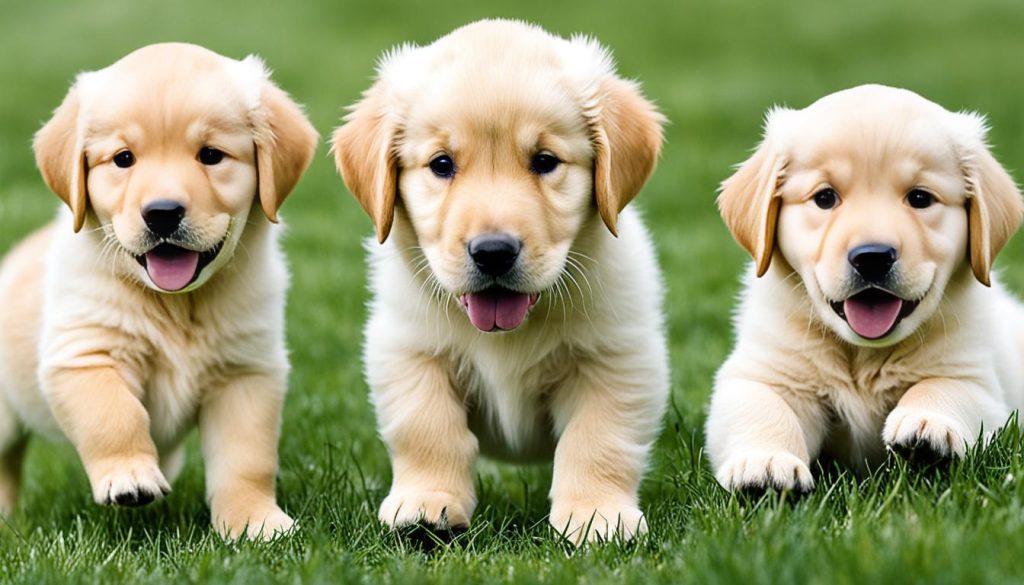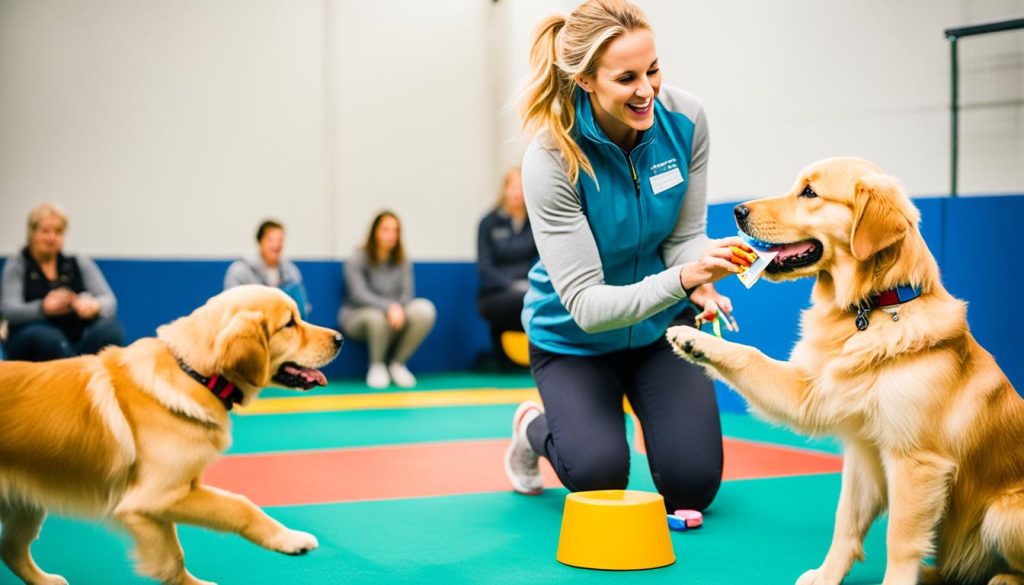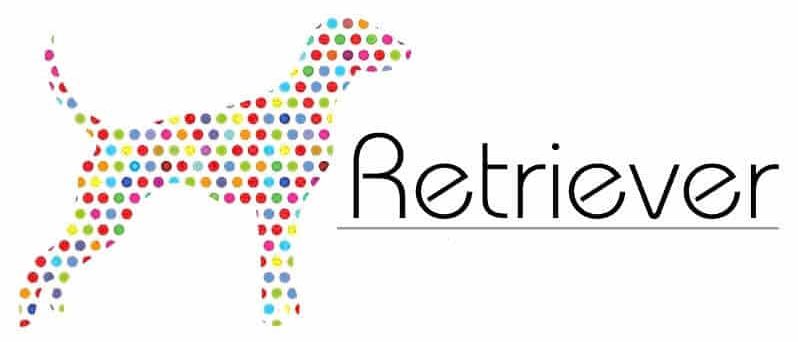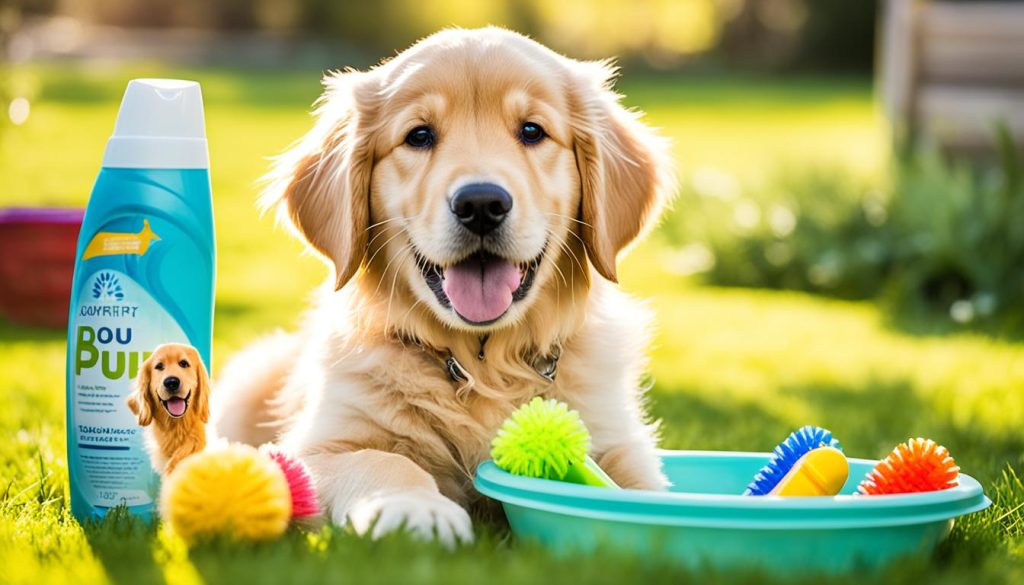Embarking on the journey of rearing a golden retriever puppy offers a blend of rewarding experiences, challenges, and moments of triumph. These dogs are notably friendly and intelligent, demanding focused care and consistent training to unlock their full potential. Establishing a strong foundation in pet care is critical for fostering a healthy, contented canine. It’s vital to grasp the unique requirements of this beloved breed to create an optimal environment for their growth.
Proper guidance in canine training and breed-specific knowledge empowers even first-time owners to forge a deep connection with their golden retriever. This ensures their development into well-rounded adult dogs. Guidance from veterinarians and experienced owners, supported by advice from recognised canine bodies, provides the cornerstone for this detailed guide.
Key Takeaways
- Understanding the tailored care requirements unique to golden retrievers.
- Key facets of golden retriever training crucial for their development.
- The importance of a structured pet care routine for your puppy’s health.
- Utilising effective canine training tactics to promote positive behaviours.
- Insights into the distinctive traits and needs found within this dog breed.
Understanding Your Golden Retriever Puppy’s Needs
Providing an optimal start for retriever puppies necessitates a deep understanding of their unique nutritional, health, and developmental requirements. These aspects are crucial in nurturing a healthy, sociable dog that will mature into a vital family member. It involves meticulously attending to each facet to ensure the puppy’s growth is on the right trajectory.
The Essentials of Proper Nutrition
Puppy nutrition plays a pivotal role during the initial months of a retriever’s life. This period is foundational for ensuring robust growth and development. A diet enriched with proteins, fats, and essential nutrients is fundamental. It supports their rapid development and caters to their high energy demands. Hence, it’s crucial to provide breed and age-specific food as recommended by pet nutritionists.
Creating a Safe and Comforting Environment
Crafting a safe pet environment is imperative. Your residence must transform into a sanctuary that fosters exploration yet is devoid of dangers. Establishing dedicated zones for both rest and play is vital. It aids in a puppy’s emotional growth and ensures their safety. This environment fosters a sense of belonging and tranquility for the newcomer.
Recognising Signs of Good Health and Development
Vigilance towards puppy health is essential in overseeing a pup’s growth and wellness. Regular veterinary visits and monitoring developmental milestones are necessary. These actions are instrumental in cultivating a balanced dog, prepared for a fulfilling life. They underscore a commitment to their longevity and happiness as an integral family companion.

An authoritative understanding of retriever care incorporates recommendations from The Kennel Club and pet health experts. For dietary guidance, a nutrient comparison chart for different growth stages offers invaluable insights. It assists in formulating a comprehensive diet plan tailored to your puppy’s evolving needs. This approach is central to fostering a well-nourished, contented pet ready for life’s endeavours with your family.
| Age Range | Protein | Fats | Carbohydrates | Vitamins & Minerals |
|---|---|---|---|---|
| 2-4 months | High | Moderate | Low to Moderate | Essential Mix |
| 4-6 months | High | Moderate | Moderate | Calcium, Phosphorus |
| 6-12 months | Moderate to High | Moderate | Moderate | Joint Support |
| 12+ months | Moderate | Low to Moderate | High | Adult Formula |
Successfully addressing the needs of your golden retriever puppy ensures their optimal development and happiness. It entails a harmonious blend of nutritional support, a secure living space, and attentive care towards their health and growth. These elements are fundamental in preparing your pet for a vibrant life as part of your family.
Effective Training Techniques for Golden Retrievers
Owners of golden retrievers often marvel at their pet’s adaptability and eagerness to learn. With their background as capable hunting dogs, golden retrievers bring an impressive set of instincts to the training field. A structured approach to canine training is essential to harness their innate intelligence and enthusiasm. Professional dog trainers agree that training golden retrievers should be approached with patience and consistency, employing techniques that appeal to their natural predispositions.

As receptive and intelligent dogs, golden retrievers respond best to positive reinforcement. This means that rewarding good behaviour with treats, praise, or playtime is key to motivating them and reinforcing desired actions. Scolding or punishment can be counterproductive, particularly with such a sensitive breed. The aim is to build trust and a strong bond between the trainer and the dog, leading to a successful golden retriever training experience.
Another central aspect of training golden retrievers involves tapping into their heritage as hunting dogs. Activities that mimic the challenges of hunting—such as retrieving objects or navigating obstacle courses—can keep training sessions engaging for these intelligent dogs. Additionally, it promotes mental stimulation, which is crucial for maintaining a golden retriever’s sharpness and contentment.
- Introduce commands clearly and consistently to ensure they associate the word with the action.
- Engage in daily exercise routines that combine physical workouts with obedience training.
- Offer a variety of challenging tasks to stimulate their intellectual curiosity.
- Ensure socialisation with other dogs and people to develop their calm and friendly nature.
Conclusively, the nuances of training golden retrievers revolve around utilising their natural abilities as intelligent dogs and former hunting companions. Established canine behaviour specialists advocate for a tailored and sympathetic approach, acknowledging each retriever’s individual personality and learning pace. Adopting these effective training methods not only nurtures your golden’s abilities but also strengthens the companionship you share.
The Golden Retriever’s Role as a Family Dog
Golden Retrievers epitomise the quintessential family dog, heralded for their steadfast dog companionship and capacity to develop profound connections with each family member. They are celebrated for their amiable nature, showcasing the perfect fusion of affectionate and intelligent traits, essential for pet socialisation.
Fostering Socialisation and Friendly Behaviour
Facilitating socialisation is vital for cultivating a Golden Retriever’s affable personality. Early exposure to diverse surroundings, sounds, and experiences is crucial. It ensures their adaptability, fortifying their renown as sociable canines.
Integrating Your Puppy Into a Household with Children
Involving golden retrievers with children highlights their inherent gentleness and patience. Their ability to accommodate children’s exuberance, while maintaining calmness and protection, affirms their role as excellent family pets.
Understanding the Breed’s Need for Companionship
The desire for companionship is intrinsic to Golden Retrievers. They thrive in settings that foster active engagement with both humans and other animals. This emphasises the fundamental need to integrate dog companionship into their care for optimal well-being.
| Activity | Benefits for Socialisation | Impact on Family Integration |
|---|---|---|
| Group Training Classes | Encourages interaction with other dogs and people | Improves obedience and provides family bonding experiences |
| Regular Park Visits | Exposes pets to diverse environments and teaches adaptability | Fosters a sense of protection and provides a relaxed setting for family outings |
| Family Play Sessions | Strengthens the dog’s friendly nature and playful spirit | Encourages gentle behaviour, especially with small children |
In summation, these traits solidify the Golden Retriever’s position as an ideal choice for a friendly dog suited to family life. Whether through pet socialisation or forming nurturing bonds with children, Golden Retrievers excel in becoming integral family members and lifelong companions.
Conclusion
At this juncture, we contemplate the profound responsibility and joy that embody golden retriever ownership. Early pet care stages demand a mixture of patience, consistency, and educated approaches. Our exploration of canine education has revealed retrievers’ impressive ability to adopt training methods. These not only enhance their natural competencies but also strengthen their relationships with their humans.
Undoubtedly, golden retrievers flourish when showered with love and engagement, characteristic of their role within the household. This nurturing from puppyhood to their later years, anchored by proper nutrition, health care, and emotional support, lays the foundation for a life filled with harmony. Adherence to these critical care elements shapes a well-rounded dog, emblematic of ideal companionship.
Engaging deeply with the various dog care aspects discussed enriches the bond between golden retrievers and their owners. Implementing these principles ensures a mutually rewarding companionship. Armed with this knowledge, you are poised to rear a golden retriever who epitomizes health and happiness—a testament to devoted care.
FAQ
What are the specific care needs of golden retriever puppies?
Golden retriever puppies necessitate consistent exercise and a diet that’s nutritionally complete. Regular health check-ups and persistent training are essential. They also demand socialisation with both humans and other animals for balanced personality development.
How can I ensure I’m providing my golden retriever puppy with proper nutrition?
Employing a diet specifically crafted for puppies, particularly those tailored for large breeds like golden retrievers, is crucial. This diet must be rich in proteins essential for growth and contain balanced proportions of fats, carbohydrates, vitamins, and minerals. Seeking advice from a veterinarian or a pet nutrition expert is advisable to customise a feeding regimen that suits your puppy’s unique requirements.
What does creating a safe environment for my puppy entail?
To ensure a safe environment, you must puppy-proof your home by eliminating harmful substances and small ingestible objects. Additionally, establishing a serene, comfortable retreat for rest alongside a specific feeding and toileting zone is necessary.
How can I monitor my golden retriever puppy’s health and development?
Ensuring consistent visits to the vet for health check-ups and vaccinations is pivotal. At home, attentiveness towards your puppy’s vigour, appetite, stool regularity, and physical growth is crucial. Prompt vet consultation is urged upon observing any abrupt health shifts.
What training techniques are effective for golden retriever puppies?
Positive reinforcement methods, comprising treats and verbal praise, prove exceptionally successful with golden retrievers. Commencing training promptly, focusing initially on elementary obedience, and gradually integrating breed-specific retrieving commands are advisable.
Why is socialisation important for golden retriever puppies?
Socialisation stands paramount for golden retrievers to mature into adaptable, well-mannered canines. It curtails the emergence of fear and aggression, empowering them to confidently mingle with diverse animals, humans, and in varying settings.
How should I introduce my golden retriever puppy to my children?
Introductions should occur under watchful supervision within a tranquil, controlled setting. Instructing your children on gentle, respectful interactions ensures the safety of both parties. Acclimatizing your puppy to the children’s activities and sounds mitigates fear and agitation.
What are the companionship needs of golden retrievers?
Golden retrievers, being immensely sociable, flourish through engagement with their human counterparts. They crave considerable attention and affection, necessitating active participation in shared activities. Disregarding their companionship needs may precipitate behavioural complications, including separation anxiety.

